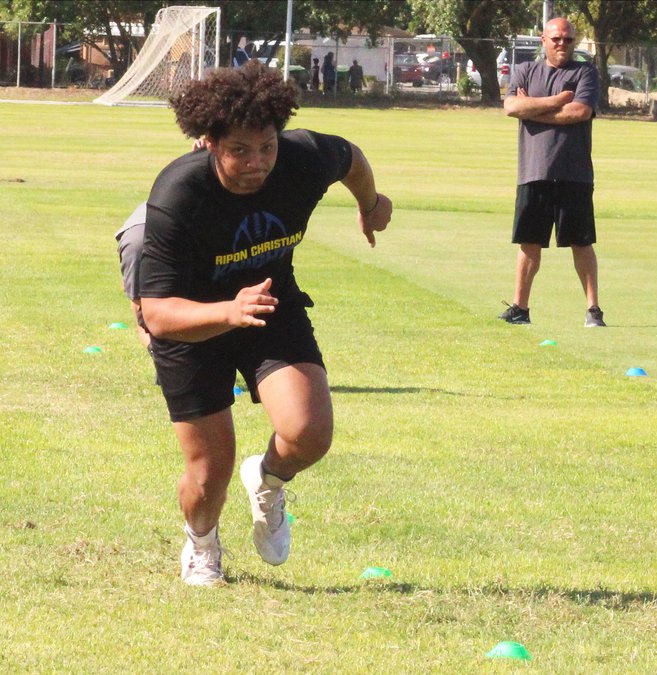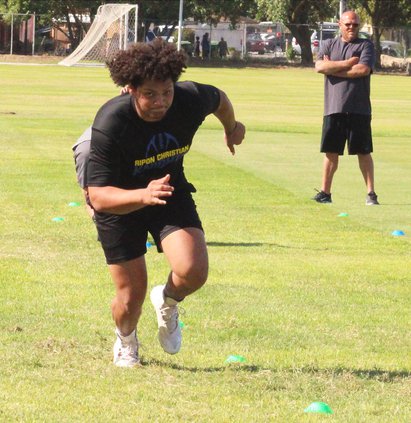Football is returning to the Central Valley amid the coronavirus pandemic.
A 14-team club football league called California Association of Private Sports kicks off Friday with contests held at undisclosed locations. The league is operating independently of the state's federation for high school sports, and its full-contact practices and games are going against California Department of Public Health guidelines for youth sports.
The CAPS season ends at the end of March, with each team playing six or seven games. Each club has up to two age-based teams for the 19-under and 16-under divisions. Clubs are scattered across five different counties in Northern California — San Joaquin, Stanislaus, Sacramento, Sonoma and Kern. There are 720 players and 172 coaches involved. While most of the clubs derive from private-school programs, CAPS President Phil Grams said that 28.9 percent of the athletes hail from public schools. Grams serves as director for the local club team, Knights Outdoor Fitness & Skillz Academy. He is also the first-year head coach at Ripon Christian.
“These kids have been playing since junior football and for most of them this is the pinnacle — most will not play at the next level,” Grams said. “How about the kids who have been told to be patient for your senior year (to get more playing time)? Your time will come, but not for you guys (current seniors).
“This is not just about them getting film,” he added, addressing concerns for some players who lack game highlights for college recruiting. “This is about getting kids getting out and playing as much football as they can and returning to normalcy as much as possible.”
Low-contact sports have already begun to return in California. The final high school events of the 2020 calendar year were played in mid-March, and California Interscholastic Federation called off the rest of the spring season two weeks later.
The latest CDPH guidelines require counties to be in the orange tier for high-contact outdoor sports such as football, soccer and water polo to take place, but 53 of the state's 58 counties remain in the most-restrictive purple tier — two levels from orange.
Sports allowed in the purple tier are cross country, golf, swimming, tennis and track and field.
CAPS may be going against guidance from state and county health officials, but Grams said it is in compliance with the safety requirements of California Youth Football Act (CA-AB1). And even though the league is not associated with the CIF, clubs are following an acclimatization plan similar to what is in place for Sac-Joaquin Section schools. Since players are just about through with the acclimatization process, Grams said it is too late for players to sign up for a club.
“We're not breaking any rules,” he said. “All of our coaches are certified. We just want to help the kids get back to playing.”
Club sports are common in basketball, baseball, softball and soccer but is new to football. The Southern California-based Winner Circle Athletics Champions League is the first known tackle football club league in the country and recently ended its winter season that included out-of-state squads and Iron Sharpens Iron Football Academy from Sacramento. A spring season is planned with a bigger field of clubs involved.
Grams said that planning for CAPS began in October. He said there was some initial push-back because of the perception of money-making club sports organizations that form all-star teams.
“At the time, everyone was against it because of the model,” Grams said. “We said, 'What if we used more of a community model?' We have experienced, high school coaches who do it the right way.”
Grams said CAPS clubs are funded by private donors or through sign-up fees. Money goes to purchasing equipment, renting facilities and paying game officials. He added that clubs are fully insured for facility and accidental-injury liability.
COVID-19 protocols are in place for game days. Venues will be capped at 25% capacity, fans will be have temperatures checked and locker rooms won't be available to teams.
CAPS did not widely publicize the formation of the league or its season schedule.
“We're doing this for the normal high school football player,” he said. “This is not money driven. It's secretive because we want the kids to play. It's nobody's business, these kids just want to play football. If too many people are involved it could spoil their opportunity.”
And if the opportunity comes for players to compete for their high schools in the coming weeks, Grams said CAPS will immediately end its season. The CIF has set an April 17 as its final contest date for football.
CIF bylaws prohibit student-athletes to compete for their schools and club teams simultaneously.
Grams doesn't anticipate future football seasons for CAPS.
“We would rather not,” he said. “Our whole plan is if CIF starts back up we'll give up all the money put into this. If CIF says we're playing games, for sure we're willing to stop it all.”





